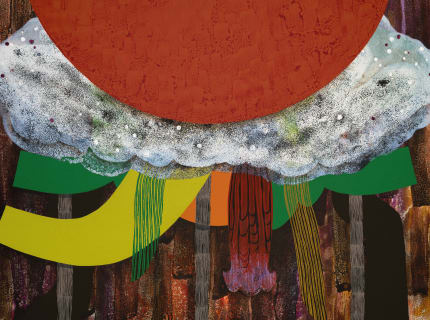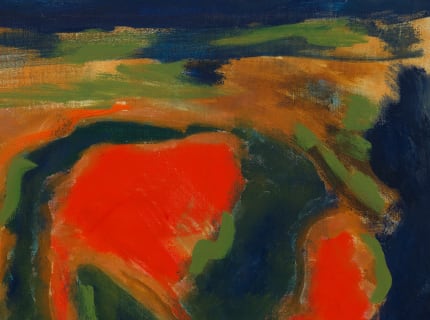I Spy
Alexander Gray Associates, Germantown presents I Spy, a group exhibition of paintings, works on paper, and sculptures by Jennie Jieun Lee, Carrie Moyer, and Betty Parsons. Spanning more than a half-century of artmaking, I Spy spotlights alternative, yet complimentary approaches to abstraction that embrace optical pleasure and compositional play. Together, Lee, Moyer, and Parsons use nonrepresentation to challenge divisions between content and form, embedding pseudo-figurative imagery into their work for viewers to parse out over time.
All three artists employ color to inject a sense of spontaneity and verve into their abstractions. Deeply influenced by Color Field painting, which she championed at her eponymous gallery, Parsons filled her canvases with expressive fields of deeply saturated pigment—acid greens, bright oranges, and mellow blues and grays. For the artist, color was not only experiential, but also referential. She used it to infuse an agitated buzz into the organic shapes of Forms (1976) while also applying it to evoke the effects of a sun-dappled lawn on a dazzling spring day in Spring Start (1976).
In her paintings and works on paper, Moyer pays homage to the history of chromatic abstraction that informed Parsons’s practice. Her compositions and techniques nod to influential female modernist painters like Helen Frankenthaler and reflect her long-standing engagement with feminist and queer theory. Combining elements of Pop Art with Color Field painting and graphic design, paintings like Spilt Milk (2023), which boasts a thin, milk-like splatter of white paint, freely move between representation and abstraction. This playful seesawing—a simultaneous rejection and embrace of formalism—allows Moyer to elevate the visual, to revel in luminous expanses of acrylic, glitter adorned shapes, and textured biomorphic forms, while infusing these elements with content.
Like Moyer, Lee crafts works that erode divisions between figuration and abstraction. Her ceramic busts reference a history of three-dimensional portraiture while challenging the conventions of the genre. Bathed in dripping, layered rivulets of glaze, the colorful, animated surfaces of these sculptures have an uncanny physicality that transfigures them into something distinctly other. In contrast, the rhythmic groupings of vessel-like forms, curving tubes, and slabs of clay that define Lee’s wall reliefs possess a meditative lyricism. With titles that allude to specific dates and times—May 27, 2020 (2020) and Monday at noon (2019)—these constructions read as still lifes, tributes to past moments.
Lee, Moyer, and Parsons’s distinct approaches to abstraction are united by their shared joy in exploring the potentials of their chosen mediums. Their works use color and referential forms to speak to present moments while also looking beyond them. As Moyer concludes, “But I’m getting such joy—to use a corny word—in the studio from just the process of making work. It’s like, ‘Oh, wow, look at this, enjoy this, come into the space where you get to be transported.’ I think we are living in a particular atmosphere right now. Perhaps the desire to protect an emotion like joy is more political than ever.”



